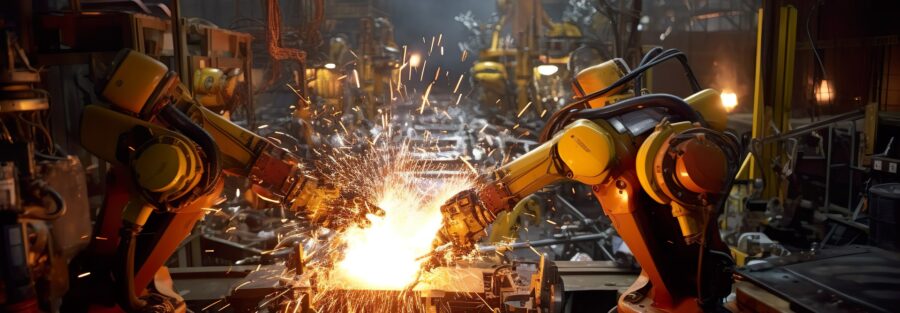Artificial intelligence (AI) and automation are at the heart of the manufacturing industry’s digital transformation. These disruptive technologies are accelerating production by removing key barriers and providing insight into the workings of the entire manufacturing process — from raw materials to final product.
MILL5 can help you capitalize on this exciting production paradigm shift. We can maximize manufacturing processes in every form of manufacturing from industrial to pharmaceutical by integrating AI into the production environment. We use AI to reduce your costs, increase scalability, improve efficiency and solve problems before they become problems.
AI’s IMPACT ON MANUFACTURING — SO FAR
The last few years have seen the expedited adoption of AI in production operations. Why are so many manufacturers opening up to this novel technology?
The COVID-19 pandemic and its effect on workforces shed light on how machines don’t need to practice social distancing and don’t get sick, as Nasdaq explains. The pandemic also highlighted vulnerabilities in supply chains and production lines that when trimmed expanded margins but reduced resiliency.
Manufacturers have responded to 2020 and beyond by leveraging AI and machine learning (ML) to process and analyze data collected in connected Smart Factories in a broad range of ways:
- Integration with Internet of Things (IoT) devices to gather massive amounts of data that, when processed, facilitate rapid, real-time decision-making.
- Robotic workforces can function as an extra set of hands for human workers. “While autonomous robots are programmed to repeatedly perform one specific task, cobots [collaborative robots] are capable of learning various tasks,” says TechTarget. “They also can detect and avoid obstacles, and this agility and spatial awareness allows them to work alongside — and with — human workers.”
- Robots and AI can also enable intelligent automation for lights-out manufacturing. Automated factories run with minimal human interaction and without the need for lighting, air conditioning, heating, breaks or sick days. This AI automation has the potential to produce more products than human counterparts, with potentially fewer mistakes.
- Innovative product design and development through rapid iteration, unprecedented customization, automated experimentation, and “Smart Manufacturing” complemented by sensors that assess and react to changing conditions, says MIT Professional Education.
- Quality assurance in every step of the production process and at every quality gate that will minimize product defects and waste/scrap.
- Predictive maintenance forecasts when machines or processes will no longer meet given specifications, allowing manufacturers to proactively act on any issues that could reduce quality cycles. Keeping machinery working at full efficiency will significantly increase productivity, decrease expenses and reduce downtime.
- Forecasting the demand and movement of critical parts, resulting in significant inventory savings.
The result is companies producing more, faster and better, at a lower cost.
AI IN MANUFACTURING IS NOT WITHOUT CHALLENGES
There’s a lot of skepticism about introducing AI solutions in manufacturing and whether the costly investment is justified, says the National Institute of Standards and Technology. Much of the hesitation stems from the challenges over initially implementing the AI.
According to NIST, implementation boils down to the three Ps: problem, persona, process:
- Carefully defining a suitable problem for AI to solve.
- Having enthusiastic buy-in from leadership, operations, IT/tech, digital transformation and finance.
- A process and approach that understands and identifies the right way to tackle a problem with AI.
Also, there is the issue of incompatibility between machines, especially older equipment. As American Machinist breaks down, “Manufacturing sites often have a wide variety of machines, tools and production systems that use different and sometimes competing technologies, some of which may be running on outdated software that is not compatible with the rest of their system. In the absence of standards and common frameworks, plant engineers must determine the best way to connect their machines and systems, and which sensors or convertors to install.”
Finally, AI technologies gathering data can pose a risk to security, privacy and compliance with regulatory regulations.
Manufacturers — especially small job shops with limited budgets — shouldn’t tackle deploying AI in vacuum. You need experts that can work with you to get the best results from AI complementing your current systems and processes.
MILL5 EMPOWERS MANUFACTURERS TO DO MORE WITH LESS
MILL5 can empower manufacturing and production to do more with less using AI automation and ML tools. We level up manufacturing with a digital transformation.
MILL5 has used AI/ML and IoT in manufacturing settings to achieve powerful results for clients. AI was used
extensively with the Emerson Electric project, helping the company move away from SCADA and into the cloud.
MILL5’s utilization of AI with Emerson provided improved IoT data with real-time insights using streaming analytics. This abundant access to transparent information has given Emerson a leg up with preventing future equipment problems, Edge decentralized insights, quality controls and logistics.
FOR MORE INFORMATION ABOUT MILL5
AI’s impact will continue to thrive in the manufacturing sector with the support of knowledgeable and forward-thinking stakeholders. MILL5 wants to work with manufacturers to stay competitive in a rapidly changing market with AI innovations that can help achieve strategic goals.
"*" indicates required fields









































